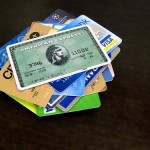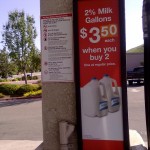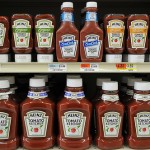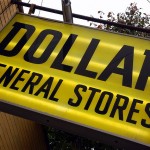by Patricia Walling
Every year there are millions of Americans who struggle to afford health care. This can be due to insurance companies raising premiums, but there can be other reasons too. For example, many people who are either unemployed or ...
Continue reading How to Choose a Reasonable Health Care Plan on a Budget
Pick Your Plastic: How to Choose the Right Credit Card
by Joy Paley
Joy Paley is a guest blogger for Pounding the Pavement and a writer on the subject of becoming a nail technician for the Guide to Career Education.
There are lots of good uses for the seemingly dozens of credit card offers most ...
Continue reading Pick Your Plastic: How to Choose the Right Credit Card
Are You Smarter Than A 5th Grader? Guess the Price of This Milk.
On the way home from work today I decided to pull into my infamous neighborhood corner gas station and fill up the gas tank. Judging from the price I paid, it was most likely the most expensive gas in town. As usual.
Now even though my local ...
Continue reading Are You Smarter Than A 5th Grader? Guess the Price of This Milk.
A Simple Trick to Get iTunes Songs at a Significant Discount
I've written before about my insatiable addiction to iTunes; it's one of the biggest money leaks I have to deal with on a monthly basis.
Believe it or not, some months I'll spend upwards of $100 on iTunes songs for my iPod, although I'm trying my ...
Continue reading A Simple Trick to Get iTunes Songs at a Significant Discount
My Ketchup Taste-Test: Upset! Guess Which Brand Topped Heinz
Ketchup is the most popular condiment in the United States, and if you ask one hundred people what their favorite brand is, ninety-nine will usually say Heinz. As for the other guy, he'll simply say he doesn't like ketchup, period. It's true.
Then ...
Continue reading My Ketchup Taste-Test: Upset! Guess Which Brand Topped Heinz
Deal or No Deal? Comparing Dollar Stores to Walmart & Others
Did you know that dollar stores have been around since 1955 when Dollar General opened its first one in Springfield, Kentucky? It's true.
Granted, in terms of purchasing power, a dollar went a lot further back then -- equivalent to just a hair ...
Continue reading Deal or No Deal? Comparing Dollar Stores to Walmart & Others
My Store-Brand vs. Name-Brand Blind Taste-Test Experiment #3
Okay. If you are a regular reader here you know the drill by now, so feel free to skip to the juicy parts!
Are name-brand groceries really worth the extra cost when alternative cheaper store-brand groceries are available? More specifically, when ...
Continue reading My Store-Brand vs. Name-Brand Blind Taste-Test Experiment #3
Buying Glasses? 3 Facts Your Eye Doctor Doesn’t Want You to Know.
Oops, my bad. This is a guest post from some guy who wasn't who he said he was and was trying to make a few bucks off of an affiliate link. � Still, I can attest to the information �within this post as being accurate, as I too buy my glasses and conta ...
Continue reading Buying Glasses? 3 Facts Your Eye Doctor Doesn’t Want You to Know.
My Store-Brand vs. Name-Brand Blind Taste-Test Experiment #2
Are name-brand groceries really worth the extra cost when alternative cheaper store-brand groceries are available? More specifically, when it comes to edible products, does the quality and taste of name-brand products always justify the price premium ...
Continue reading My Store-Brand vs. Name-Brand Blind Taste-Test Experiment #2
10 Off-the-Wall Gifts for Open-Minded People
Hey! You know what I haven't seen lately on the blogosphere? A personal finance post on great gift ideas! ;-)
I'm kidding. Kinda. After all, there are already some great pieces on Christmas gift ideas for military members.
So... Are you tired ...
Continue reading 10 Off-the-Wall Gifts for Open-Minded People
Talkin’ Turkey: Evaluating My Thanksgiving Dinner Scorecard
This year Thanksgiving dinner is at my house. We'll be serving dinner for 16 people including my sister and her family, my mom and dad and the Honeybee's folks.
You know, since he came out to visit a few weeks ago, my father-in-law Tony has taken ...
Continue reading Talkin’ Turkey: Evaluating My Thanksgiving Dinner Scorecard
My Store-Brand vs. Name-Brand Blind Taste-Test Experiment
One of the great never-ending debates in the world of personal finance is whether or not name-brand groceries are really worth the extra cost when alternative cheaper store-brand groceries are available. Furthermore, when it comes to edible products, ...
Continue reading My Store-Brand vs. Name-Brand Blind Taste-Test Experiment
Why Low-Cost or No-Fee Products May Not Be Such A Good Deal
This is a guest post by Mr. Credit Card from www.askmrcreditcard.com. � Today, Mr Credit Card is going to talk about how getting into the cheap, lowest cost mentality may not be the best thing for every purchase that we make. � This is a slight depart ...
Continue reading Why Low-Cost or No-Fee Products May Not Be Such A Good Deal
Scary Stories: Fellow Bloggers Share Their Tales of Buyer’s Remorse
According to Wikipedia, buyer's remorse is "an emotional condition whereby a person feels remorse or regret after a purchase." � It often refers to higher-priced items that are difficult or impossible to return, thereby making the buyer feel like, we ...
Continue reading Scary Stories: Fellow Bloggers Share Their Tales of Buyer’s Remorse
Evaluate Your Options Before Selling Gold Jewelry
I was watching a King of Queens marathon late last night and my viewing enjoyment was continually being disrupted by those ubiquitous Cash4Gold ads that urge viewers to collect their unwanted jewelry so it can be turned into "cold, hard, ...
Continue reading Evaluate Your Options Before Selling Gold Jewelry
- « Previous Page
- 1
- …
- 10
- 11
- 12





